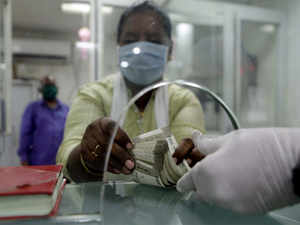 ANI
ANIThe last six weeks has brought several unprecedented challenges to the economy and to the finance sector. The efforts made by the policy makers and the financial regulators are truly commendable. The efforts made by the banking system to handle the systemic risks arising out of Yes Bank were very efficiently addressed. The possible run on the bank was very well averted. Then came the lockdown. On the front of social distancing to curb the menace of the pandemic, effective steps are well carried out.
In the backdrop of this scenario, various doubts are being raised on the economy and the impact of this pandemic to the GDP growth. Pandits have expressed their views on either side discussing the impact. It is important to perhaps examine the core strengths and weaknesses of our economy. One of the largest strengths is our population and the demography of it. The weakness is absence of large-scale health care infrastructure needed to address the pandemics. Between economy suffering due to lockdown and people suffering if the lockdown is partially lifted or relaxed, we must choose.
Will the economy bounce back after the pandemic is effectively addressed is the question that engages our minds. There are several factors which indicate that it will, if some of the core elements are properly addressed. The economy is characterized by a sizeable demand arising out of the population needs. This demand is suppressed under the present situation as people consume only the necessities, and all non- primary requirements are pushed back. Once the conditions normalize the demand will rise and so could manufacturing and services.
Lok Sabha Elections#Elections With 
- All
- Uttar Pradesh
- Maharashtra
- Tamil Nadu
- West Bengal
- Bihar
- Karnataka
- Andhra Pradesh
- Telangana
- Kerala
- Madhya Pradesh
- Rajasthan
- Delhi
- Other States
The challenges to this hypothesis are many and include the argument of size of our organized sector compared to unorganized sector, the uneven distribution of income and the flow of incomes and cash in the system. The organized sector accounts for about a fifth or sixth of our economy. If we go by the income distribution indicators, about ten percent of our population gets more than three fourth of the total income generated by the economy. Then there are other factors including dependence of imports of our consumption and keeping our economy fueled. Now we understand our dependence on bulk drug supply and other critical items. We also consume a substantial order of spurious and wasteful goods from other economies. Our dependence on China in this regard has become very conspicuous.
On the aspect of making essentials including food distribution, effective announcements have already been made. A relief package of 1.7 lakh crores has been put in place. It includes both cash and food distribution. This will ensure smooth flow of cash to the lower middle class and the destitute. The support will eventually lead to more consumption and therefore more procurement subsequently. Also, presently the cash distribution will trigger multiplier impact. One could expect more infusion of such support if situation demands.
The measures announced by the RBI are equally commendable. The debt repayment moratorium is certainly a good measure. The clarification rendered in this regard is noteworthy. It is a deferment and not a waiver. Neither principal amount, nor interest till repayment has been waived. This clarifies the extent of burden on the already crippled public sector banking system. So is the rate reduction and CRR cut. It eases the pain of individual as well as institutional debtors and ensures liquidity in the system. We have used our reserves for supporting currency and managing liquidity for this larger cause. Going forward the RBI will have to use its resource in managing inflation, interest rates and currency. This will require a high order of plan and close coordination of the policy makers, the regulators and the industry.
Going forward, one expects reduction of GST burden generally and particularly for the necessity goods. GST reduction in identified sectors will encourage consumption of selected goods and services. We all expect the government to bring in radical changes in our healthcare sector. The warning bells should make us all look at more efficiency in this regard. There can be no further expectations on relaxation of direct taxes, both for individuals as well as institutions. However, once the situation of pandemic is brought under control which could take a quarter or two, there can be expectations on flow of capital and on divestment plans. More sectors may be relaxed from the point of view FDIs.
There is enough evidence to suggest that the policy makers, the regulators and the sectors are making correct moves and the fiscal discipline parameters will be changed.
The author is Managing Partner, Ashvin Parekh Advisory Services LLP. Views are personal.
Read More News on
Download The Economic Times News App to get Daily Market Updates & Live Business News.
Subscribe to The Economic Times Prime and read the ET ePaper online.
Read More News on
Download The Economic Times News App to get Daily Market Updates & Live Business News.
Subscribe to The Economic Times Prime and read the ET ePaper online.













 Get Unlimited Access to The Economic Times
Get Unlimited Access to The Economic Times
